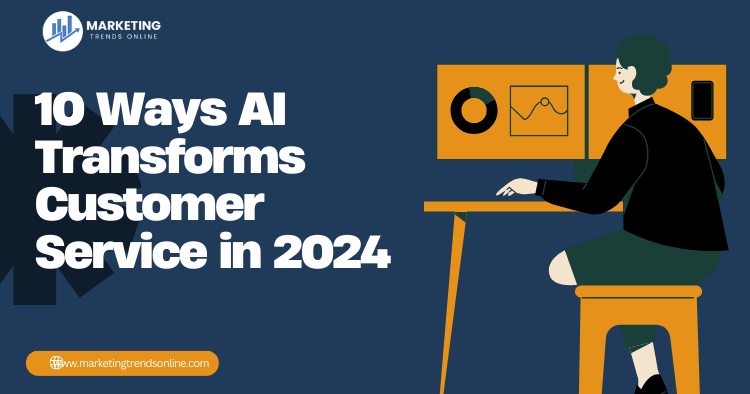Table of Contents
- Introduction
- 1. Personalized Customer Interactions
- 2. 24/7 Availability
- 3. Improved Response Times
- 4. Automated Ticketing Systems
- 5. Chatbots and Virtual Assistants
- 6. Predictive Analytics
- 7. Enhanced Data Analysis
- 8. Multichannel Support
- 9. Customer Feedback Analysis
- 10. Cost Efficiency
- Conclusion
- FAQs
Introduction
As we step into 2024, the customer service landscape is evolving rapidly, thanks to artificial intelligence (AI). AI isn’t just a trend; it’s a transformational force reshaping how businesses engage with their customers. In this post, we’ll explore ten ways AI is revolutionizing customer service this year, making it more efficient, personalized, and responsive than ever before.
1. Personalized Customer Interactions
Gone are the days of generic customer service. AI allows businesses to tailor interactions based on individual customer data. By analyzing previous interactions, preferences, and purchase history, AI can create personalized experiences that resonate with customers.
Why it matters: Personalized service fosters loyalty and improves customer satisfaction. According to a study by Salesforce, 66% of consumers expect companies to understand their unique needs. For more on personalization strategies, check out Top 7 Content Personalization Trends 2024-2025.
2. 24/7 Availability
In our global marketplace, customers expect support around the clock. AI-powered systems can provide 24/7 customer service without the need for human agents to be present. This ensures that inquiries are addressed promptly, regardless of time zones.
Benefits:
- Increased customer satisfaction
- Reduced wait times
- Enhanced accessibility
3. Improved Response Times
AI technology significantly reduces response times. With machine learning algorithms, AI can quickly analyze customer queries and provide instant solutions or direct them to the appropriate human agent if needed.
Statistics: A report from Zendesk shows that AI can reduce response times by over 50%, leading to happier customers and more efficient service. For insights on content strategies that enhance engagement, visit Top 7 Long-Form Content Trends 2024.
4. Automated Ticketing Systems
AI-driven ticketing systems can classify, prioritize, and route customer requests automatically. This means that urgent issues are addressed promptly, and less critical matters are queued efficiently.
| Feature | Benefit |
|---|---|
| Classification | Automatically sorts tickets |
| Prioritization | Urgent issues are escalated quickly |
| Routing | Directs tickets to the right department |
5. Chatbots and Virtual Assistants
Chatbots are the front-line heroes of AI in customer service. They can handle a variety of tasks, from answering FAQs to assisting with transactions. In 2024, chatbots are smarter than ever, utilizing natural language processing (NLP) to understand and respond to customer queries more effectively.
Case Study: Companies like Sephora use chatbots to guide customers through product selections and provide personalized recommendations. For more on user-generated content and its role in customer engagement, see Top 7 User-Generated Content Trends 2024.
6. Predictive Analytics
Predictive analytics leverages AI to anticipate customer needs based on historical data. By analyzing patterns, companies can foresee potential issues and proactively address them, enhancing customer satisfaction.
Example: If a customer frequently purchases a certain product, AI can send reminders or special offers before they run out. For more on how businesses can leverage data analytics, refer to Top 7 Content Curation Trends Shaping 2024-2025.
7. Enhanced Data Analysis
AI can sift through vast amounts of customer data to identify trends and insights. This capability allows businesses to make informed decisions about service improvements and marketing strategies.
Visual Element: Here’s a simplified table comparing traditional data analysis to AI-driven data analysis:
| Aspect | Traditional Analysis | AI-Driven Analysis |
|---|---|---|
| Speed | Slower | Near-instant |
| Accuracy | Prone to human error | Highly accurate |
| Scalability | Limited | Highly scalable |
8. Multichannel Support
Customers today engage through a multitude of channels—social media, email, live chat, and phone. AI enables businesses to provide consistent support across all these platforms, ensuring a seamless customer experience.
Benefit: This unified approach leads to higher customer retention rates as customers appreciate the convenience and consistency. Explore more about social media trends impacting customer engagement in Top 7 Social Media Engagement Trends 2024.
9. Customer Feedback Analysis
Gathering customer feedback is vital, but analyzing it can be overwhelming. AI tools can automate this process by parsing through reviews and surveys to extract actionable insights, helping businesses improve their services.
Why it’s important: Regular analysis of customer feedback allows companies to adapt and evolve, meeting customer expectations head-on. For effective feedback strategies, look into Top 7 Content Marketing Metrics to Track in 2024.
10. Cost Efficiency
Implementing AI in customer service can significantly reduce operational costs. By automating routine tasks, businesses can allocate resources more effectively and focus on complex issues that require human empathy and creativity.
Cost Savings: A report from McKinsey suggests that AI could save businesses up to $400 billion in service delivery costs by 2025. For more insights into cost-effective content strategies, visit 10 Proven Strategies to Boost Your Content Marketing ROI.
Conclusion
As we navigate through 2024, the impact of AI on customer service is undeniable. From personalized interactions to improved efficiency and cost savings, AI is transforming the way businesses engage with their customers. Companies that embrace these technologies will not only improve customer satisfaction but also gain a competitive edge in the market.
FAQs
Q: How does AI improve customer service?
A: AI enhances customer service by providing personalized interactions, automating responses, and analyzing data to anticipate customer needs.
Q: Are chatbots effective in customer service?
A: Yes, chatbots can handle a wide range of queries and provide quick responses, improving overall customer satisfaction.
Q: Is AI in customer service cost-effective?
A: Absolutely! AI reduces operational costs by automating routine tasks, allowing businesses to focus on more complex customer needs.
Q: Will AI replace human customer service agents?
A: While AI can handle many tasks, human agents are still essential for complex issues that require empathy and nuanced understanding.
For more insights on AI in customer service, check out Forbes and Gartner.




